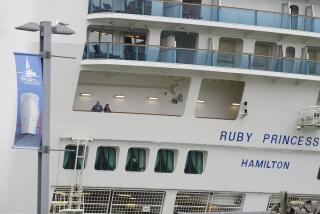Ship Operators Say They Can Pay Off Debts : Refunds: California Cruise Lines has enough cash to reimburse 5,000 or more passengers who bought tickets.
- Share via
Operators of the Pride of San Diego have pledged to pay refunds to the 5,000 or more passengers who bought tickets before a cash shortage caused the San Diego-based cruise ship to suspend operations April 27.
California Cruise Lines, which operates the ship, said it can make the refunds and pay the ship’s suppliers. “We have enough cash . . . to close our doors and leave no bad taste behind with anybody,” said Dick Rudolph, chief executive of California Cruise Lines.
The idled ship remained at the 10th Avenue Pier on Monday as its operators continued to seek a much-needed cash infusion. The company has “several” deals in the works that, if completed, might return the ship to cruising later this week, Rudolph said.
However, Rudolph acknowledged that any deal must be approved by a U.S. Bankruptcy Court judge in Miami, where the ship’s Florida-based owner recently entered Chapter 11 bankruptcy proceedings. The bankruptcy, which is independent from California Cruise Lines’ financial woes, “complicates” the return to operations because the proceedings are moving slowly toward a conclusion, Rudolph said.
The ship began offering one-day cruises to Ensenada in January, featuring Las Vegas-style entertainment, meals and gambling. Rudolph linked California Cruise Lines’ financial woes to a string of unrelated events that sapped the new company’s cash reserves.
Rudolph said the Pride of San Diego had been forced to cut its rates in order to compete with Starlite Cruises, a competitor that began offering similar one-day cruises on the Pacific Star in late December.
The ship, which offered one-day cruises to Ensenada at prices ranging from $39 to $99 per round-trip ticket, began sailing on Jan. 15--the day hostilities broke out in the Middle East. The Gulf War dramatically reduced reservations, producing an unexpected drain on California Cruise Lines’ cash reserves, Rudolph said.
While business picked up after the war ended, reservations fell off again in March when San Diego was hit by a series of rainstorms.
“When two boats go head to head, there is naturally a lot of competition,” Rudolph said. “But both companies are operating at significant deficits.”
The Pride of San Diego and the Pacific Star have been struggling to turn a profit with the one-day cruises, but the two companies evidently were beginning to develop a following among Southern Californians, said Don Harrison, director of the San Diego Cruise Industry Consortium, which markets San Diego’s cruise industry.
Due in large part to the one-day cruises, San Diego’s port handled more passengers during the first four months of 1991 than during all of 1990, when 115,000 passengers passed through the port, Harrison said.
During 1990, the Port of San Diego attracted ships that were offering cruises of three days or longer. “So you can see the difference that the (one-day cruise) companies made,” Harrison said.
But Harrison suggested that Southern California might not yet be ready for two cruise companies.
“The competition (between the two young companies) was very, very rough,” Harrison said. “It appears that we had the shootout at high noon and that one of them got wounded. In time, though, the market might grow to the point that it could support two ships.”
The Pride of San Diego and Starlite Cruises’ Pacific Star “were both running at about one-third of capacity,” Harrison said. “I have a feeling that . . . Starlite will eventually inherit the Pride of San Diego’s passenger list.”
Rudolph acknowledged that, with the passage of time, it will become more difficult for the Pride of San Diego to resume operations. “The longer we do not go forward the worse off we as as a viable enterprise,” Rudolph said.
The Pacific Star and the Pride of San Diego were the only ships in California offering daylong cruises that feature gambling. According to a ruling by the state attorney general, cruise ships departing from California ports can legally offer gambling only if they stop in a foreign port prior to returning, Harrison said.
More to Read
Sign up for The Wild
We’ll help you find the best places to hike, bike and run, as well as the perfect silent spots for meditation and yoga.
You may occasionally receive promotional content from the Los Angeles Times.






